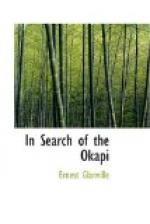As they plunged deeper into the woods over a yielding surface of leaf-mould, which sent up a warm smell, the silence was as the silence of a huge cavern, into which is borne the hollow rumbling of the waves, the sound in place of that being the continual murmur of the sea of leaves moved by a breeze ever so slight, so soft that no chance breath of it found its way below.
Yet the place was not really silent, and by-and-by, as their ears grew attuned to the new surroundings, the boys detected the sounds made by living things large and small, far and near—sounds which seemed a part of the silence, because they were all soft and a little mysterious, with a pause in between, as if the insect or creature which made them was listening to find if any enemy had heard him. They were little detached sounds, as if an insect would start out to sing its song, and then suddenly think better of it; and even when some large animal made its presence known by the snapping of a branch, or a sudden scurry in the undergrowth, the noise ceased almost as soon as it began.
“It gives me the creeps,” muttered Venning, after a long silence.
“That’s just it,” said Compton; “everything appears to be creeping.”
“Even the trees. They seem to watch and whisper and wait, and the news of our coming has been carried right away for miles. Shouldn’t wonder if the trees were to close in and shut us up.”
“Oh, come, now; that’s a bit too fanciful.”
They shifted their loads to relieve aching shoulders, and kept on through the unending avenues in another long spell of silence.
“Reminds me of the reeds again,” said Compton; “only this is worse.”
“By Jenkins! just imagine the blaze and the scorch if this forest caught afire like your reeds.”
“Couldn’t—too damp. We’ve been tramping for two hours, and I have not seen a bird, or an animal, or a reptile; nothing but snails and ants. Don’t see where the game comes in.”
“We’re not after game; we’re after cannibals.”
“By Jove! yes, I suppose we are—that is, if they are cannibals. I thought the species had died out.”
“It will be a long time before cannibalism dies out,” said Mr. Hume, who was bringing up the rear, “particularly in those parts where the people find a difficulty in getting flesh-food; but, at the same time, scarcity of flesh-food does not always turn a tribe to cannibalism. What does happen is this—that people who live in a poor district become small In the Kalihari you find the bushmen, in the forest you find the pigmies.”
“Then the forest is poor in animals?”
“It has its types, but I should say they must be very few. You see, animals want sun, And where would they find it here? No! what animals haunt the forest will not be found on the ground.”
“I see,” said Compton, with a grin; “they fly.”
“I know,” interposed Venning, triumphantly; “they live in the tree-tops.”




